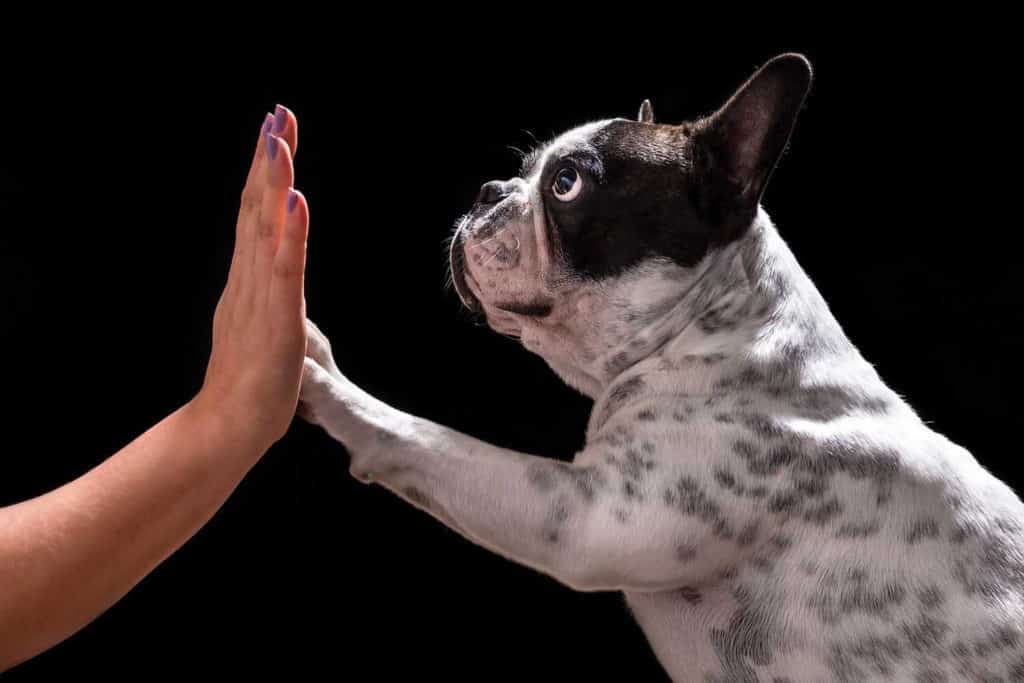
Have you considered you can begin training your Frenchie and transform his life?
Let’s be honest: some people believe in educating their French Bulldogs, and some don’t. But, training is more than just tricks like “sit” and “stay”. Training is essential for helping your Frenchie understand his role in the family and his connection with you.
The good news is that you don’t have to go looking for an intensive program or teach him 50 different tricks “just because”. Since you’re a proud pet parent, you can just focus on the basic French Bulldog puppy training that is most important for dog health and happiness, and then make your own decision regarding the commands and tricks that you want to teach him. Excited to get started with your new addition?
Here is your guide on French Bulldog training tips to help you conquer all of the bases with your brand new pooch:
- Respect
- Potty training
- Crate training
- Household life and socialization
- Basic commands and tricks
Overall, French Bulldogs tend to be easy to train. However, they are known for having a stubborn streak in them (especially when it comes to potty training). So, while French Bulldogs may dig in their heels when it comes to practice more than other dogs, you can succeed in basic training and commands. It all starts with respect.
Instill Respect in Your French Bulldog
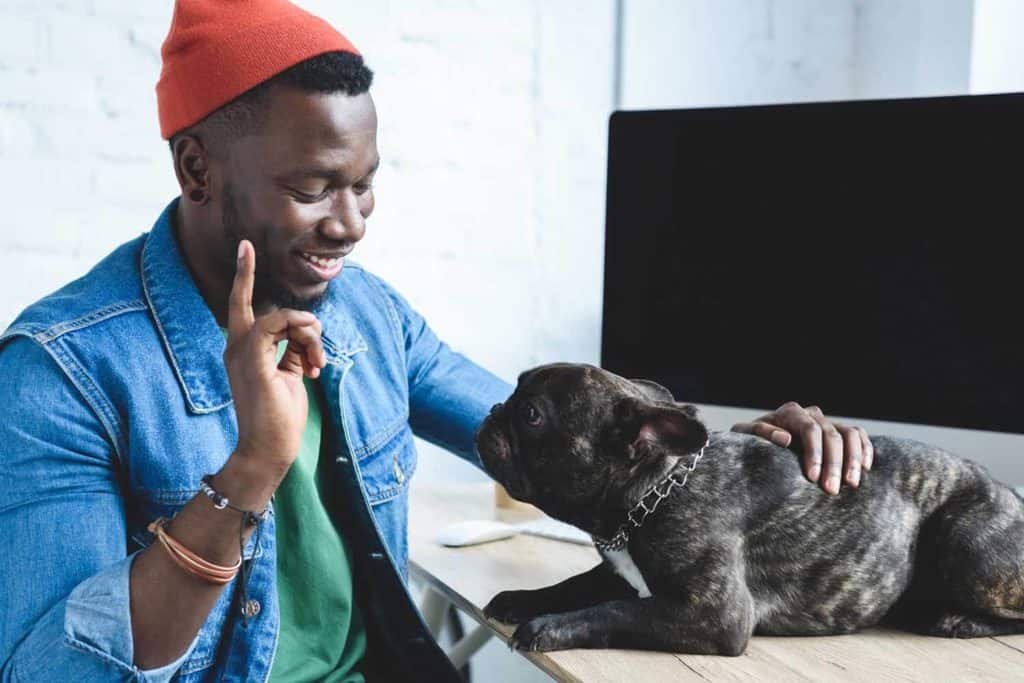
Before you can get anywhere with your puppy, you have to focus on the idea of respect. This is a commonly overlooked or ignored part of the training, but it’s vital to help your French Bulldog make connections and understand the family network.
With your new puppy, respect training looks a little like this:
It Shows Your French Bulldog That You Are in Charge
When you earn your Frenchie’s respect, it shows that you are in charge of the household and him. Many dog parents worry that they are forcing their Frenchie into submission, but this is not the case at all!
Your French Bulldog is a social creature, and he likes to be in a family unit. He wants to follow rather than lead, and if you earn his respect as the household leader, the dog obeys you. If you don’t earn his respect, he will not follow you!
It Helps Your French Bulldog Feel Safe And Secure
As mentioned above, French Bulldogs enjoy following rather than leading. If they know that you are in charge, they’ll feel comfortable and safe because you are protecting them and the household.
If you are wishy-washy and just let him do whatever he wants, he will have to be in charge all the time. This can actually create extra stress for your pooch! Earning his respect as the household leader means that he’ll be able to feel safe and secure within your family.
Your Frenchie Is Like Your Child
When it comes to your relationship and connection to your French Bulldog, it’s very similar to your child. Your child has rules and must listen to you because they are your dependent.
The same can be said for your pooch! This shift in your perspective can often help you see the importance of the relationship and connection that you have with your Frenchie.
Respect is so important because this is the core concept of what gets your pooch to listen to you. It’s much the same with kids. A child who doesn’t respect his parent or babysitter won’t listen to them or follow their commands.
Your Frenchie is going to have the same mindset. Getting anywhere with even the basic training concepts requires respect to be earned first.
The good thing with your furry guy is that respect isn’t something you need to “scare” into him. Respect is earned by being consistent, kind, patient, loving, and firm with all of the training that you are doing.
All of these things will help your French Bulldog understand that you are a leader worthy of respect. After that, it will be easy for them to “fall in line” beside you and do what you tell them to do.
Potty Training Your French Bulldog
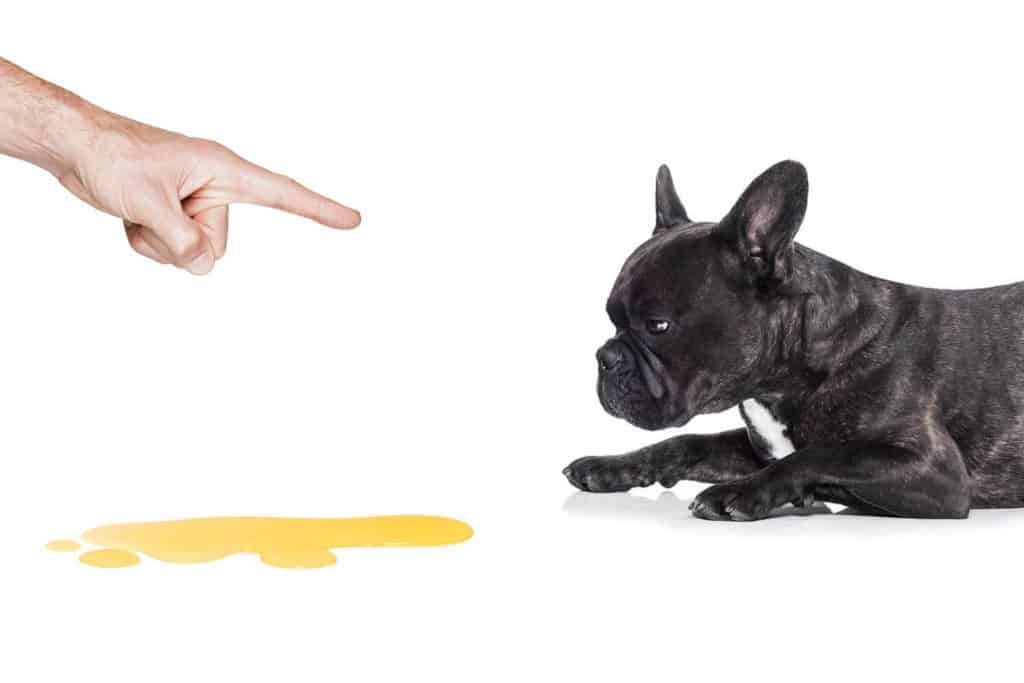
As far as the actual training goes, you’ll find it best to start potty training firstly! As mentioned, this can be particularly difficult for Frenchie’s parents, but it is absolutely possible to focus on the right details.
Firstly, the reasons Frenchie puppies are so hard to start potty training are their small bladder, compared to most dogs, who have larger-sized bladders. This means that they have to go more often. Any other dog, like larger dogs, can hold their pee for 8 or even 12 hours, French Bulldogs can only hold their pee for 4 hours maximum. This is talking about an adult Frenchie rather than a puppy.
A French Bulldog puppy, like all puppies, doesn’t have a lot of control over his bladder. He might be 4 or 5 months old before he can effectively hold his pee without having an indoor accident. This is not your puppy’s fault!
You can start potty training dogs generally at 7 weeks old, or when you first get him to your home. To make this as positive and rewarding as possible, here are the key things to focus on when it comes to healthy bathroom habits:
Always Bring Your Frenchie to the Same Spot and Let Him Explore It Liberally
As soon as you get your Frenchie home, you’ll want to take him outside immediately to the designated area where he is to make his bathroom.
Always take him to the same potty spot and encourage him to explore it as much as he wants. More or less, he’ll find his favorite place and use the bathroom on his own. This often helps him in the future, too, because he can smell his scent and is more likely to go again.
Always Take Your French Bulldog Out After Mealtime
Just like humans, your pupper will have to go to the bathroom shortly after he’s eaten. Make it a habit to take him outside about 15 to 20 minutes after he’s eaten.
Take him to his designated spot and wait for him to go. At first, it may take a while for him to get used to it, but eventually, he’ll learn the routine, will instinctively avoid peeing indoors and do it quickly whenever you lead him to the designated spot.
Watch for and Get to Know His Signs
To prevent an accident in the house, you’ll want to know the signs of needing to go to the bathroom. For most French Bulldogs, this means panting and roaming around with his nose to the ground, searching for just the right spot to let it go.
Other dogs will sit and stare out the window or scratch on the floor. As he gets used to potty training, he may also look at you and pant. If you notice this, take him outside and be sure to give him lots of love if he successfully goes to the bathroom.
Praise Your French Bulldog, Don’t Scold
The reality is that your doggo will go to the bathroom in the house, at some point or another. It’s standard with young puppies and even older ones that you adopt later. When this happens, don’t scold your puppy or even try to rub his nose in the mess that they made.
Instead of understanding that pooping in the house was terrible, he’ll become scared of you or even of going to the bathroom. Just ignore him and don’t give him attention one way or the other.
When He Does Successfully Go to the Bathroom Outside
Make sure you give him lots of praise and treats and positive affection. He’ll adequately associate that going to the toilet outside makes his favorite human happy. This is what you want. Even if he’s successfully going to the bathroom outdoors, give him praise each time.
Clean Up Messes As Soon as They Happen
When there is an accident inside the house, make sure that you clean up the mess as soon as possible. Not only does it stop the smell and protect your floor, but it also helps make sure that your furry friend won’t go back to the same spot when he needs to go again.
You’ll want to also use an approved cleaner that will get all of the scents out of your flooring, as French Bulldogs will often make their way back to the area they smell their odor and go again.
Since Frenchies can be challenging to potty train, you’ll want to try making sure that you start it as soon as you can — 7 or 8 weeks old — and give it months to settle in as a habit for your pooch.
Also, skip the pee pads that you can get for the inside. Get him used to go outside at the beginning to prevent confusion and laziness for the French Bulldog.
Crate Training Your French Bulldog
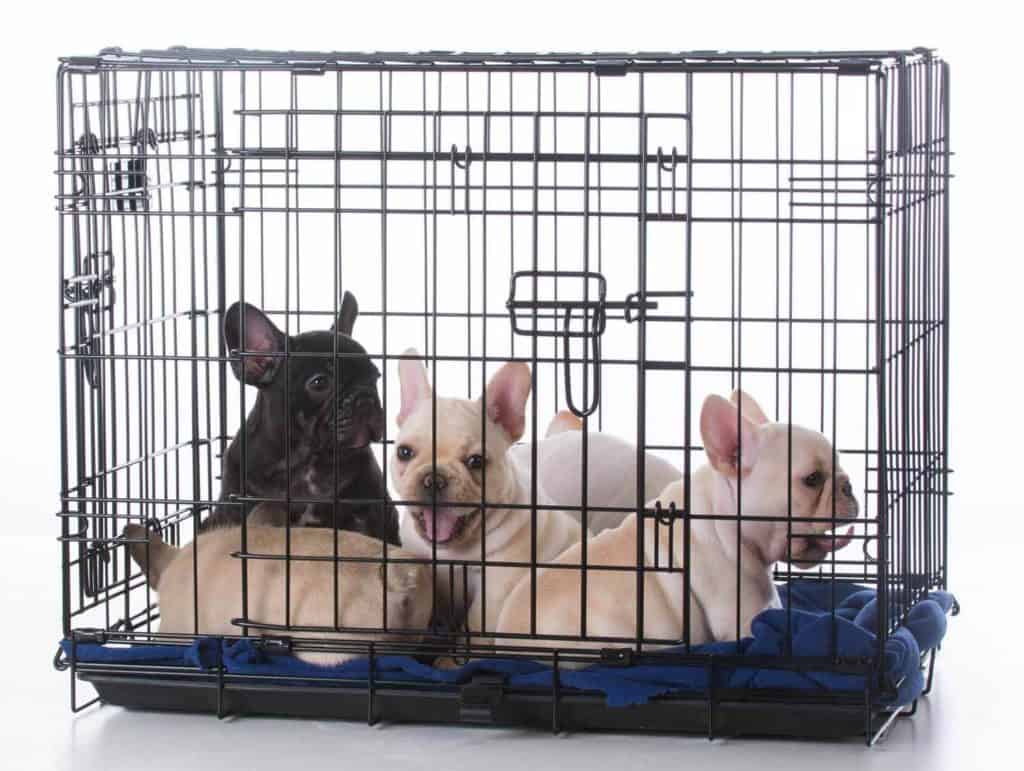
Another dog training must-do for your Frenchie is crate train! This is an excellent option for those who live in busy homes. Or even for those who like to travel a lot. The crate itself should be carefully chosen to make sure that it will still be plenty big for him to move in (and be able to completely turn around in) even when he is full-grown. A confined space is unadvised since it even works as a sleeping area.
Here’s how to make crate training work for your pooch:
Put The Crate in a Quiet, Calm Area
Pick an area of your home that is quiet and doesn’t get a lot of traffic. Put the crate there and leave it (unless you are using it to take him to the vet, etc.).
Add Some Treats and Blankets
Add some of your Frenchie’s favorite treats inside and some soft blankets that are perfect for curling up in. You can add some self-soothing toys, too, as long as they won’t hurt him.
Pen Him for Short Periods
Getting him used to the crate, pen him in it for short periods of time. Start with 5 minutes, then 10 minutes, and so-on. When he is in the crate, ignore whining or barking until that time is up. Make this part of your daily routine, and he’ll come to expect it. Eventually, he’ll enjoy his time in the crate.
Allow Him to Use It As He Wants To
Once you’ve got him used to the crate, you can allow him to come and go as he wants to. He’ll love snuggling up in it when you’re at work, too. It’s like his own little “Frenchie cave”.
One mistake that a lot of new dog parents make is that a crate is a time-out. A crate is actually a happy place for a pooch to spend his time, much like a puppy home. He’ll enjoy curling up there when he needs a little pooch time, and you’ll love that he has space all to himself to do that in.
Household Life And Socialization
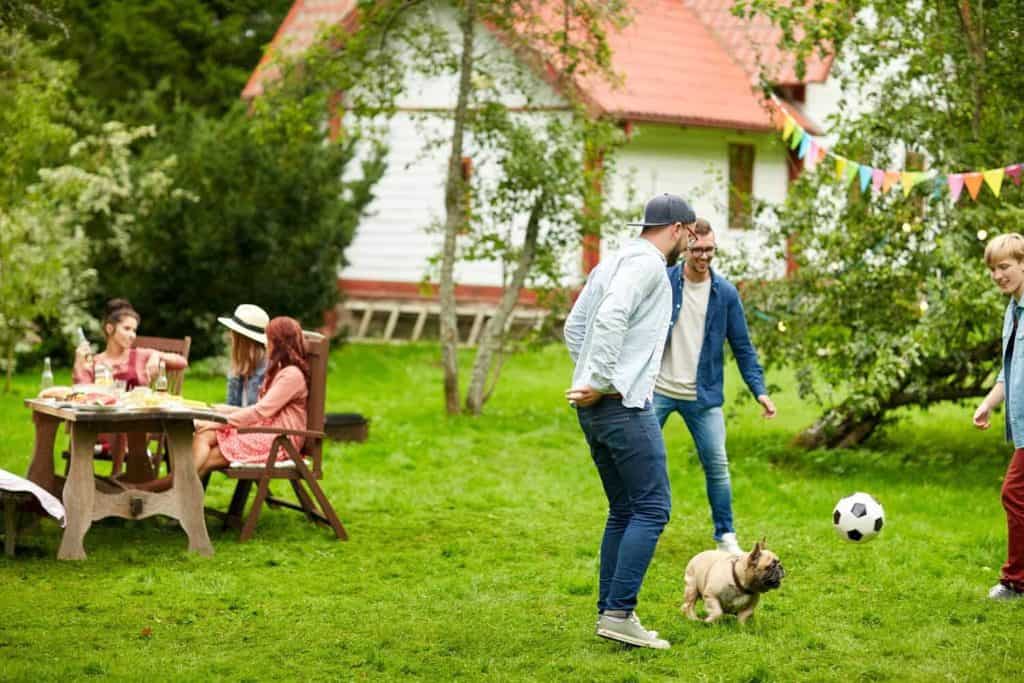
Now that your French Bulldog is part of your household, you’ll need to integrate him into your family! This means other pets and also other humans. There is a right way to do this as well as a not-so-right way, and you’ll want to do what you can to do what’s best for your Frenchie. Here are some tips to help you with both joining the household as well as socialization.
Go at Your Frenchie’s Pace
When it comes to bringing your Frenchie out into the rest of your home or introducing him to the pets or other people in your home, you’ll want to make sure that you go at his pace. Some French Bulldogs will be shier than others, and in order to make sure that your pooch feels comfortable with the new changes, you’ll want to pay attention to what he wants to do as much as possible.
Leash-Train Him
When it comes to meeting new people or going to the dog park, make sure you leash train him first. While French Bulldogs are properly trained to walk on a leash (letting it go slack as you walk with him, and listening to his commands), they’ll respond better when they are in social situations that may be overwhelming. Eventually, you can allow your French Bulldog off-leash — such as at dog parks — as they are very good at being off-leash when trained. But you’ll want to make sure you are comfortable with his level of socialization first.
Teach Him How to Be With Other Animals and Strangers
The honest truth is that this is one of the jumpiest and excitable dogs, compared to other breeds. They get wound up easily, have little patience and often will be overexcited when it comes to meeting new people and new animals; they are easily distracted and this may bring unwanted behaviors.
This is where your leash training and proper respect are really going to come into play. If your French Bulldog knows to listen to you and to respect you, he’ll be able to find his sense of calm. A leash is good, too, because you can use that to keep your pupper under your control and pull him back to you if he isn’t listening.
Basic Commands and Tricks
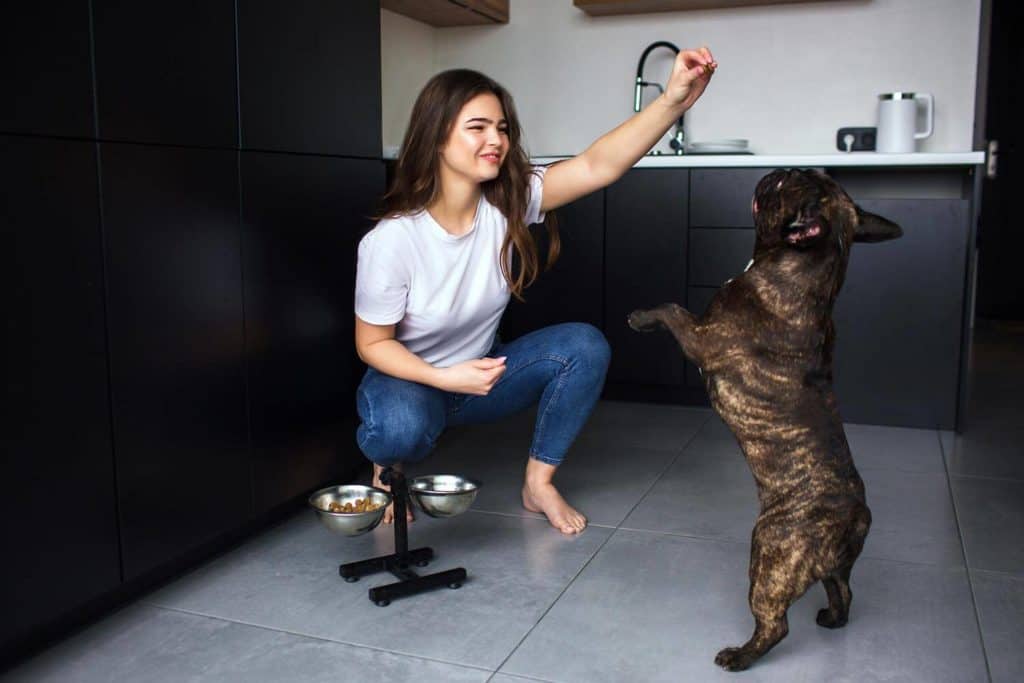
You can start to teach your Frenchie commands and tricks when they are about 10-16 weeks old. They are very good at learning and will enjoy the training process as much as you will! Despite popular belief, you won’t want to train your French Bulldog puppy by taking him to a class. Often it can just be a place where he picks up bad habits, so stick to training at home as much as you can so he can form habits that are healthy and continuous.
For assistance, some may prefer clicker training, as the clicker sound is used every time there is positive reinforcement for the dog to recognize it, at every training session. Some people also resort to a training collar, but we will leave both options out for now.
Here are some great commands and tricks:
Teach the Word “No”
This is one that you can start teaching when your puppy is about 8 weeks old. Make sure you hold an authoritative voice when saying it, and don’t be afraid to use their name before the word “no”, too. Your Frenchie recognizes their name as a command, so it will get their attention. They are smart dogs.
Teach Sit and Lie Down
These are great for general puppy life and can be taught at 9 or 10 weeks.
Teach Come and Stay
These are especially important for dog park adventures as well as when you take him in the car and you want him to stay in it when you open the door. These are great for 12-14 weeks.
Teach Drop It and Fetch
Great for when your dog is eating something he shouldn’t or when you want to encourage him to play. These are also useful tricks for 12-14 weeks and beyond.
There are many other kinds of tricks and commands that you can teach your smart French Bulldog, but these are the best ones. It’s worth noting that your Frenchie can show bad behavior when he is bored or frustrated. If he is left alone for 8 hours and isn’t walked enough (or stimulated enough with human interaction), he’ll act out and misbehave or even destroy your belongings. Make sure that you give him plenty of exercise and attention. commands and tricks are great ways of doing both of these things and he will be loving life!
Proper training sessions for your Frenchie will help him be happy and keep those high standards when it comes to pet health, so I hope you find the article helpful. Training dogs is really a life long process, as they need to be reminded who is in charge so they continue acting as they should, thanks to continuous training. These few tips will help make the most out of it, be able to successfully train your pooch and give you plenty of fun to have with your new furry addition!
